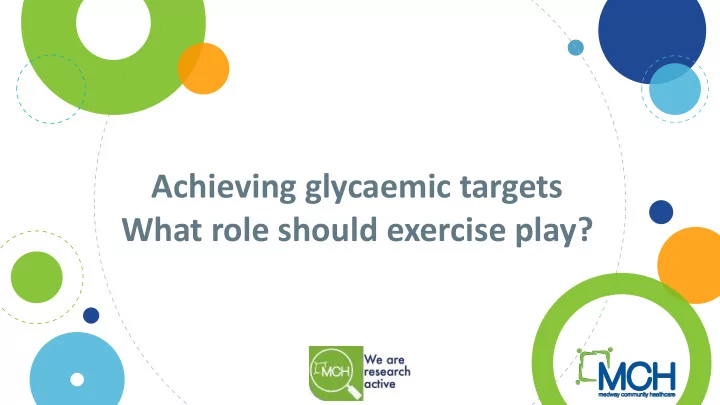

Achieving glycaemic targets What role should exercise play?
GOOD MORNING I am Jane Redding ◎ Declaration ◎ I am not receiving any payment for this presentation. ◎ I work for MCH and I am not affiliated to any other organisation Email: jane.redding@nhs.net
LEARNING OBJECTIVES To have a basic understanding of the physiology of exercise in people with Diabetes To appreciate the benefits of exercise for people with Diabetes To understand the difference in effects of exercise in type 1 and type 2 Diabetes To explore motivation and adult learning styles
Question Does exercise Increase blood glucose? Decrease blood glucose? Have no effect? Have multiple effects on blood glucose?
Physiology of exercise Glucose is the main fuel for giving energy for movement. So during exercise blood glucose CAN fall Insulin is the hormone that transfers the glucose from our blood to our cells Our bodies release glycogen from our livers to supply more glucose However exercise increases the uptake of glucose and reduces insulin resistance These effects can last for up to 48 hrs
BLOOD GLUCOSE ACTION TO TAKE <5 mmol take 10-20g cho before exercise 5-6.9 mmol take 10g cho before exercise 7-10 mmol only aerobic exercise and no cho before >15 mmol check for ketones and follow usual advice but do not exercise
If on pump reduce % delivery up to 90 mins before exercise If on mdi can reduce short acting insulin before exercise but also look at increasing cho Never exercise within 48 hours of hypo needing 3rd party assistance Insulin intake before during and after exercise may need to be reduced by up to 80%
During prolonged exercise high gi carbohydrates will need to be consumed such as energy drinks If weight loss is the aim then try to reduce insulin intake rather than eat more carbohydrates Carbohydrate loading does not work in diabetes
What percentage of people with diabetes have type 2? 90% of people with diabetes have type 2 diabetes What percentage of people with type 2 have a BMI over 25? 90% of people with type 2 diabetes have a bmi over 25
Activity or exercise? Definition of activity - the condition in which things are happening or being done, a thing that a person or group does or has done, a thermodynamic quanti. Oxford English dictionary Definition of exercise - an activity requiring physical effort carried out to sustain or improve health and fitness. Oxford English dictionary
A University of Bristol-led study found 80% failed to meet the government target of taking moderate exercise at least 12 times in a four-week period
What do our patients think when we encourage them to take regular exercise?
BENEFITS OF MOVEMENT
CONTRAINDICATIONS Most people will benefit from being more active but if a person has active prolific retinopathy they may be advised to avoid certain activities.
UK recommendations for exercise • at least 150 minutes of moderate aerobic activity such as cycling or brisk walking every week and • strength exercises on 2 or more days a week that work all the major muscles (legs, hips, back, abdomen, chest, shoulders and arms)
UK recommendations for exercise Or: • 75 minutes of vigorous aerobic activity such as running or a game of singles tennis every week and • strength exercises on 2 or more days a week that work all the major muscles (legs, hips, back, abdomen, chest, shoulders and arms)
UK recommendations for exercise Or: • a mix of moderate and vigorous aerobic activity every week – for example, 2 x 30-minute runs plus 30 minutes of brisk walking equates to 150 minutes of moderate aerobic activity and • strength exercises on 2 or more days a week that work all the major muscles (legs, hips, back, abdomen, chest, shoulders and arms)
UK recommendations for exercise Do you do the recommended weekly amount of exercise? Yes/No
Sometimes fitness can seem like an unattainable goal
SMART GOALS ▪ S : Specific. Start with stating the objective you wish to meet, as specifically as possible ▪ M : Measurable. Adding quantifiable or measurable criteria to your goal will allow you to measure ▪ A : Attainable. Do not set yourself up for failure by selecting unattainable goals ▪ R : Relevant. Your goal should be meaningful to you, set by you and not set by someone else ▪ T : Time . Set yourself a time limit to attain your goal
Useful resources local public health department often organise healths walks etc. Discounted local council gyms and swimming pools Exercise referral by gps www.nhs.uk Phone Apps
Diabetes UK website
All movement is good. The best exercise is one you enjoy and so will maintain.
Thanks! Any questions? You can find me at jane.redding@nhs.net
Recommend
More recommend